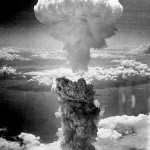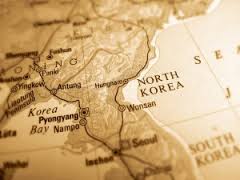According to the Vatican II document, Gaudium et spes: “With these truths in mind, this most holy synod makes its own the condemnations of total wars already pronounced by recent popes, and issues the following declaration: Any act of war aimed indiscriminately at the destruction of entire cities or extensive areas, along with their population, is a crime against God and man himself. It merits unequivocal and unhesitating condemnation” (no. 80). 
As reported in the news recently, the president of the Military Religious Freedom Foundation, Mikey Weinstein, has objected to a course, taught by military chaplain Captain Shin Soh at Vandenberg Air Force Base in California, on Nuclear Ethics and Nuclear War. He reacts especially to a section of a power point presentation focused on “Christian Just War Theory,” which he asserts is a violation of the U.S. Constitution’s First Amendment establishment clause (i.e., it does not comply with the separation of church and state). However, as the well-known just-war ethicist and historian, James Turner Johnson, correctly notes, an objective history of the just-war tradition should contain references to Christian contributions (e.g., by Augustine, Aquinas, etc.) as well as to other sources (e.g., chivalry). The basic mode of reasoning of just war can also be found in other religious traditions (including Islam)–and it is a framework that is accessible to human reason; hence, it undergirds and contributed to the rise of the modern laws of war (e.g., the Hague and Geneva Conventions). Having viewed the power point presentation myself, I agree with Johnson’s criticism rather than Weinstein’s–although it does seem to me that Captain Soh (judging from the power point presentation alone, and not from anything else he perhaps said during classes) offered a one-sided, overly biblical, and selective perspective on just war, one that argues that firing off a nuclear missile to destroy an enemy target is moral from a Christian just-war viewpoint. In other words, the course should be offered, in my view, but in a revised version that does justice to the just-war tradition itself.
For example, the revised course should devote attention not only to the jus ad bellum criteria (justice in embarking upon war) but also to the jus in bello criteria (justice in the conduct of war), namely, proportionality and discrimination. These two criteria are meant to govern the use of force during war by distinguishing between combatants and noncombatants (discrimination) and by refusing to use excessive force (proportionality); each of these taken together should minimize civilian casualties (i.e., collateral damage). Perhaps here we see why jus in bello was neglected, though, in the Vandenberg course, for in the view of most just-war theorists, including Christian ones like me, the criterion of discrimination prohibits the intentional targetting and killing of civilians. Of course, unintentional civilian deaths, even if these are foreseen as possible, are regrettable but not morally blameworthy. According to the Catechism of the Catholic Church, “Unintentional killing is not morally imputable” (#2269). However, can we truly say that firing a nuclear missile targeted at a city consisting of hundreds of thousands of civilians is congruent with the principle of discrimination, let alone proportionality? The bishops of the Second Vatican Council, as the quote in the beginning of this post indicates, thought not. Any ethic that permits (or even obliges) such an act of mass destruction is more a form of consequentialist calculus that aims at winning at all costs (as well as a form of might-makes-right) rather than a just-war ethic that seeks not merely to win but to win rightly.
On this day, August 6, when we remember the dropping of the first atomic bomb on Hiroshima, Japan in 1945, I agree with Rev. Tyler Wigg-Stevenson that there indeed continue to be lessons to be learned (and to be taught).



Tobias, I agree completely. Moreover, I think the course should include specifically not only Christian just war theory and secular (Michael walzers Just and Unjust wars book would be an excellent text for such a course) but specifically address the Holy war and Jihad traditions….A comprehensive and fair treatment of just war theory can only help those training in military academies….
I agree with you both, Tobias and Meghan. And I think your arguments could be extended beyond this one course. AAR and Chronicle of Higher Ed have had provocative articles in the last couple of years about the decline in religious competence among U.S. university students. How sad, given the complex realities of religious/ethnic/cultural influence in conflicts around the globe. Catholic universities have a unique opportunity here to integrate ethics across the curriculum. At USD there has been a big push to encourage collaboration among the Naval ROTC program, School of Peace Studies, School of Leadership, and faculty from my department. We need more of that kind of collaboration, not less.